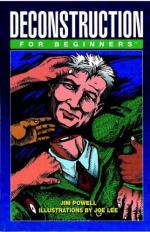|
This section contains 5,763 words (approx. 20 pages at 300 words per page) |

|
SOURCE: Butler, Lance St. John. “Beckett's Stage of Deconstruction.” In Twentieth-Century European Drama, edited by Brian Docherty, pp. 63-77. New York: St. Martin's Press, 1994.
In the following essay, Butler examines deconstructive elements in several plays by Beckett, suggesting that in them Beckett attempts to “escape … from the tyranny of the signifier.”
Beckett is the poet of the poststructuralist age. In his plays, as in all his work, we are offered something like a version of the world according to Derrida. Where Beckett has already given up the search for determinable meaning, in the 1940s and 1950s, as a vain pursuit, poststructuralism would proclaim, in the 1960s and 1970s, the ultimately undecidable nature of meaning, and would celebrate meaninglessness as an objective correlative for a new vision of the world.
Beckett started as a Modernist, offering in the poem Whoroscope, of 1929, and in the stories More Pricks Than Kicks...
|
This section contains 5,763 words (approx. 20 pages at 300 words per page) |

|


